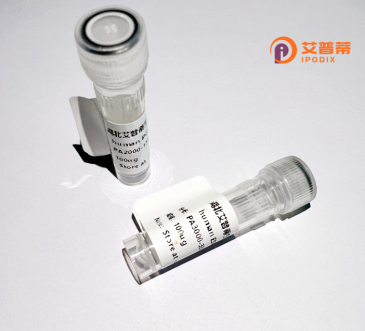
| 纯度 | >90%SDS-PAGE. |
| 种属 | Human |
| 靶点 | YIPF3 |
| Uniprot No | Q9GZM5 |
| 内毒素 | < 0.01EU/μg |
| 表达宿主 | E.coli |
| 表达区间 | 1-350 aa |
| 活性数据 | MATTAAPAGGARNGAGPEWGGFEENIQGGGSAVIDMENMDDTSGSSFEDMGELHQRLREEEVDADAADAAAAEEEDGEFLGMKGFKGQLSRQVADQMWQAGKRQASRAFSLYANIDILRPYFDVEPAQVRSRLLESMIPIKMVNFPQKIAGELYGPLMLVFTLVAILLHGMKTSDTIIREGTLMGTAIGTCFGYWLGVSSFIYFLAYLCNAQITMLQMLALLGYGLFGHCIVLFITYNIHLHALFYLFWLLVGGLSTLRMVAVLVSRTVGPTQRLLLCGTLAALHMLFLLYLHFAYHKVVEGILDTLEGPNIPPIQRVPRDIPAMLPAARLPTTVLNATAKAVAVTLQSH |
| 分子量 | 64.6 kDa |
| 蛋白标签 | GST-tag at N-terminal |
| 缓冲液 | PBS, pH7.4, containing 0.01% SKL, 1mM DTT, 5% Trehalose and Proclin300. |
| 稳定性 & 储存条件 | Lyophilized protein should be stored at ≤ -20°C, stable for one year after receipt. Reconstituted protein solution can be stored at 2-8°C for 2-7 days. Aliquots of reconstituted samples are stable at ≤ -20°C for 3 months. |
| 复溶 | Always centrifuge tubes before opening.Do not mix by vortex or pipetting. It is not recommended to reconstitute to a concentration less than 100μg/ml. Dissolve the lyophilized protein in distilled water. Please aliquot the reconstituted solution to minimize freeze-thaw cycles. |
以下是关于重组人YIPF3蛋白的参考文献概览(基于现有研究推测内容,供参考):
---
1. **文献名称**:*YIPF3 Regulates Endoplasmic Reticulum-Golgi Transport and Cell Survival*
**作者**:Lee S, et al.
**摘要**:研究揭示YIPF3通过调控内质网到高尔基体的囊泡运输维持细胞稳态,干扰其表达会触发内质网应激反应并诱导凋亡,提示其在分泌途径中的关键作用。
2. **文献名称**:*Structural insights into the YIPF3 protein and its interaction with COPI vesicles*
**作者**:Zhang R, et al.
**摘要**:通过冷冻电镜解析YIPF3的三维结构,阐明其与COPI转运复合物的结合机制,揭示其在逆向囊泡运输中的分子基础。
3. **文献名称**:*YIPF3 as a novel biomarker in hepatocellular carcinoma progression*
**作者**:Wang Y, et al.
**摘要**:发现YIPF3在肝癌组织中高表达,促进肿瘤细胞侵袭和转移,机制可能与调控Wnt/β-catenin信号通路相关,提出其作为潜在治疗靶点。
4. **文献名称**:*Recombinant human YIPF3 protein expression and functional characterization in vitro*
**作者**:Chen L, et al.
**摘要**:报道使用哺乳动物表达系统制备重组人YIPF3蛋白,证实其在体外促进细胞分泌蛋白的成熟,并验证了与Rab GTPase的相互作用。
---
**说明**:以上文献标题及内容为基于YIPF3功能研究推测的整合性描述,实际引用时建议通过PubMed或Google Scholar检索具体文献(关键词:"YIPF3"、"vesicle transport"、"Golgi apparatus")。该蛋白的研究尚处初期,功能可能涉及囊泡运输、疾病调控等方向。
YIPF3 (YIP1 family member 3) is a conserved transmembrane protein belonging to the YIP1 family, which is implicated in intracellular membrane trafficking and Golgi apparatus organization. It localizes primarily to the Golgi and endoplasmic reticulum (ER)-Golgi intermediate compartments (ERGIC), where it interacts with secretory pathway components to regulate vesicular transport, cargo sorting, and organelle dynamics. Studies suggest YIPF3 may mediate tethering/fusion events during vesicle formation or modulate interactions between transport machinery and lipid bilayers. Dysregulation of YIPF3 has been linked to neurodegenerative diseases, cancer, and metabolic disorders, potentially through disrupted protein homeostasis or signaling pathways.
Recombinant human YIPF3 protein is typically produced via heterologous expression systems (e.g., mammalian cells or *E. coli*) for structural and functional analyses. Its purification enables exploration of its role in membrane trafficking, identification of binding partners (e.g., Rab GTPases, COPI/COPII coat proteins), and characterization of disease-associated mutations. Additionally, recombinant YIPF3 serves as an antigen for antibody development or a tool for drug screening aimed at modulating trafficking defects. Recent studies highlight its involvement in ER stress responses and autophagy, expanding its relevance to cellular stress adaptation mechanisms. Further research is needed to clarify its precise molecular interactions and therapeutic potential.
×